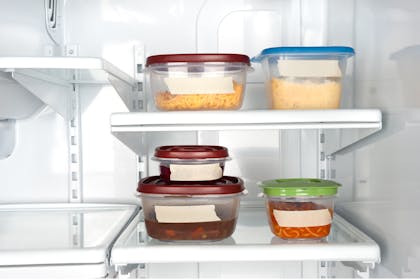Feeding your family needn't cost a fortune - a few easy tweaks when it comes to the weekly shop can save you hundreds of pounds over the year.
This page contains affiliate links, which means we may earn a small amount of money if a reader clicks through and makes a purchase. All our articles and reviews are written independently by the Netmums editorial team.
Small changes can make a big difference when it comes to cutting the cost of your food bills. Try these money-saving ideas now and after just a few weeks, you'll find your new way of shopping has become second nature.
Shockingly, the average family throws away around £420 of food a year. That's £35 a month, literally thrown in the bin. Imagine what you could do with that money instead - a treats-and-all trip to the cinema or an annual family holiday, perhaps - simply because you've organised your food shopping better! We asked you to share your best money-saving tips and advice on ways to fight food wastage.
Before you hit the supermarket
- Only give yourself a set amount of cash to spend -- 'I draw out a set amount of money each week, normally £100. If at the end of the week I still have some money left over, I only take out enough to make up £100. So if I have £20 left, I only withdraw £80. It can be quite satisfying seeing how long you can make it last and shows you don't need to keep spending for the sake of it.' Karen H
- Use your debit card to control spending -- 'I never withdraw cash, I pay with my debit card. That way if something costs £6.67, that's what comes out of the account, rather than £10, plus I'm not left with a pocketful of change that gets frittered away.' Sarah H
- Shop alone -- 'Don't take your other half or children shopping with you!' says Cath H. It's easier to stick to your list and avoid pester power for things you don't need.
- Be savvy about online shopping -- Another tip from Cath H that makes the convenience of online shopping even cheaper: 'If you do shop online, try to use the free delivery codes. If not, get it delivered mid-week when it's usually cheaper.'
General money-saving tips
Living less expensively doesn't need to be all doom and gloom. Saving money will make you feel more in control and give you the chance to spend the money saved on things you'll remember - like treats for the children and yourself. So follow these tips, to make it work for your family:
- Plan your meals -- We know, writing a shopping list might seem like you're turning into your mum. But let's face it, she was right - it really does pay to plan what you're going to eat. 'I have a weekly planner of what I'm cooking so I only buy what I need,' says Yasmeen.
- Bulk cook and freeze - if you're making a Bolognese, make double and freeze half. It takes no more effort and you'll feel so much more organised (and a little bit smug!) when there's a homemade ready-meal waiting for you a week later. Check out these top batch-cooking recipes .
- Ditch expensive takeaways -- A supermarket pizza still gives you a cook-free treat but at a fraction of the cost. Or make your own fakeaways. We've got recipes for your favourite family fakeaways to make at home, from Nando's chicken to doner kebabs to Gregg's chicken bakes.
- Get excited about leftovers -- Creating meals from your leftovers definitely doesn't mean second best. All you need to do is think before you throw: Could those chicken roast leftovers go in a risotto? Could those old bread bits be whizzed up and frozen as breadcrumbs? Read our 'using up leftovers' ideas .
- Snag end of day specials -- 'Sometimes I may do a late shop on Sunday so I can pick up bakery treats and bread for 20p,' says Yasmeen.
- Switch up your brands -- Getting out of your comfort zone when it comes to the brands you buy can add up to savings. 'If you buy named brands, try a slightly cheaper name,' says Claire G. You can also sometimes find certain ingredients -- like dried chickpeas or certain herbs -- more cheaply in the international section of big shops or in specialty food stores.
Other clever ideas:
- Always check your fridge, freezer and store cupboard before shopping, so you don't double up on food you already have. Get the children to help and suggest what meals they would like to eat that week. Use your phone to take a photo of what's in your fridge if you think you'll forget by the time you reach the shop!
- Get out of the family food rut -- It's easy to fall into the habit of making the same things over and over. Try some new suggestions from the Netmums food section , or check food blogs or Instagram for inspiration.
- Beware top-up shopping -- Top-up shopping can be an opportunity to overspend and waste since you're usually in a rush. When you make a shopping list, don't forget to include snacks and packed-lunch food.
- Use your refrigerator wisely -- When you do a big shop, it's easy to stow it all in the fridge and forget half of it's there until it's past its use-by date. If you have large portions of chicken or fish, divide them up and freeze a portion. A good trick: Have a quick clean out of the fridge before you shop, so you not only know exactly what's running low, you also have more room to store everything and see what's there when you start to cook.
- Keep an eye on freshness dates -- Regularly check the dates of perishable food in your fridge, like meat, fish and dairy products. They're the most expensive items on our food bills. So be realistic, if you're not going to have time or energy to cook a meal from scratch that evening, move them into the freezer.
Know your food labels
- ‘Use by' is the important one - don't eat anything after this date (although if it can be frozen, you may be able to eat it at a later date as long as you factor in the time it'll take to defrost).
- ‘Best before' is about quality control, not food safety. You can tell if something tastes OK to eat. One exception is eggs - don't eat eggs after the ‘best before' date.
- ‘Display until' and ‘sell by' are instructions to shop staff about stock control, and not relevant to shoppers.
For more information, check out the information about food labelling on the NHS's Livewell page.
Storing food and portion sizes
- Know your portion sizes -- It's not just over-buying that creates costly waste; daily staples like rice and pasta go in the bin because we cook too much. Check you've got your portion sizes right. For example, for two adults and three children you only need 380g of pasta. Find out more about portion sizes at Lovefoodhatewaste.com .
- Freeze your bread -- We waste an amazing 7 million slices of bread in the UK every day! But it's easy to keep a ready-sliced loaf in the freezer (separate the slices out before you freeze) and defrost for sandwiches or pop a slice in the toaster whenever you want. Large whole loaves can be cut in half and one half frozen for later in the week.
- Stay organised with a list on your cupboard door -- Keep a note on the inside your store cupboard door of any items you've used up and check it when you write your shopping list.





